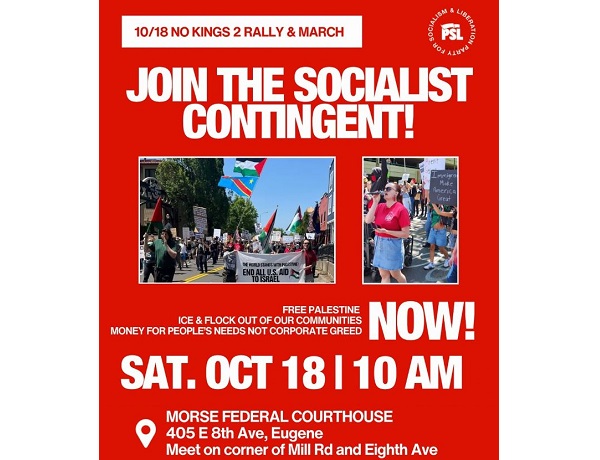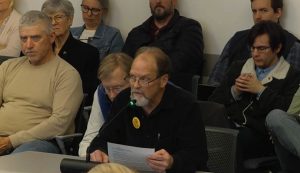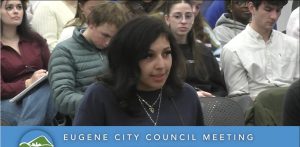PSL calls for return of a politically independent working class
7 min read
Presenter: The No Kings rally in Eugene Oct. 18 will offer an experience in active participatory democracy. From the Party for Socialism and Liberation, Sam Cook:
Sam Cook (Party for Socialism and Liberation): You know, something that I say quite a bit is: ‘Americans don’t actually have a lot of experience with democracy.’ So these types of actions where we can start to work on those muscles and get people comfortable with, ‘We are exercising, and taking advantage of our space and our resources, this is our building that we pay for on our sidewalks that we pay for.’
[00:00:34] And so the hope is really to not just act as a vent for people to be able to express their outrage (rightly) and then go back to normal, but rather have this be a piece of an ongoing communitywide conversation and consciousness-raising process. The only way that anything starts to get better or change is having more people involved at all levels, and that’s where you start to really see things shift.
[00:01:07] Even with the 10,000 people that we had in the last demonstration, we’re still not in the arena of what Lenin calls real politics, which is like, real politics starts when the millions of people are engaged. And that’s what we’re really trying to do. I think that there’s some real potential to reach that point. But it’s really only through laying the groundwork and developing the coalition and organization in which those millions of people can see a genuine alternative.
[00:01:40] What we want is a strong left-wing, strong mobilized working class in this country. That’s what we think is missing. We recognize that not everyone is going to be agreeing with our analysis. And so if people agree with us on some core principles and if we can help facilitate that with our activities, then that’s excellent and we think that helps sort of build out that process.
[00:02:05] So how do we elevate people’s thinking around politics beyond, ‘Trump is a bad guy and he is doing a bunch of bad stuff,’ but how can we actively and collectively determine what we want our country to be? How do we actually put the vast majority of people’s hands at the wheel of this country, as opposed to the billionaires who are just openly and mask off governing things?
[00:02:31] All of the institutions and social safety nets that were built in this country in the 1930s were built by militant and politically independent labor unions. You know, all of the things that we are thankful for and take for granted, like the eight-hour workday or the five-day work week, Social Security or Medicare and Medicaid, like, these were all reforms that were fought for and won by socialists and by organized and militant labor.
[00:03:02] This was before the capture of labor in the aftermath of World War II. And, you know, I really hope our presence and the unions’ presence there (at No Kings 2) can start to reclaim and carve out that sovereignty for labor unions. They have their political limitations just by virtue of what they are in this country.
[00:03:25] But they are still the organizations of the working class in a way in which they can experience seeing that like, ‘Oh wait, my interests and the interests of the boss are diametrically opposed and irreconcilable.’ And elevate that consciousness.
[00:03:41] For unions, you’re able to say, ‘Okay, you’ve been coasting on the Democratic Party for this long. Maybe we need to get back to basics. What was it that unions were doing when the working class was carving out things like Social Security and Medicaid, what was their political orientation? What was their leadership like?’
[00:04:05] And, you know, the answer to that is not Democratic Party stooges. It was people who are willing to work with the Democratic Party and people like FDR and recognize the value there. But it was a genuinely politically independent working class responding to the mismanagement of the economy by their version of billionaires, their millionaires, that led to the Great Depression.
[00:04:30] And so really trying to build that relationship of very self-consciously left-wing groups with the unions and trying to connect those struggles. And then also connecting the struggles of labor with that of immigrants or with that of trans people, trying to really explain the rights of trans people are entirely defined and colored by the reality of the capitalist economy.
[00:04:58] The vast majority of trans people are workers. The vast majority of immigrants are workers. And so they experience being a worker as an immigrant or as a trans person. Being able to see that these are just two different angles of the same struggle, two different axes of a perspective is something that’s kind of been missing and deliberately done on the part of the Democratic Party to try to say, ‘Well, labor is one interest group, or the LGBT community is one interest group, or immigrants are one interest group.’
[00:05:29] ‘Cause if you’re able to keep all of these identities independent of the broader economic identity that we all fall under, then they’re divided and they still have to see their salvation in this establishment party that is ultimately just the left wing of the ‘Capitalist Party.’
[00:05:48] The entire last half of the 20th century was dedicated to trying to completely neuter and defang the American working class because they recognized that if the American working class is militant, organized, and politically conscious, then the entire global capitalist order actually falls apart, because it is that working class that’s at the center of global finance. It’s all through the American financial system.
[00:06:20] Capitalism is entirely reliant on that as a global system. And so it was really essential to remove these tools and this sort of class memory from workers in this country. And we’re getting to a point now where conditions in this country, the cost of living is getting to such a severe point that the original issues that workers had to organize against are reemerging. And so people have to kind of rediscover these techniques, these organizational tools and these tactics and overarching strategy.
So I think we’re well on our way to that. I’m very optimistic about our prospects long-term. I think we have a real shot at being able to right the ship, but there’s still a lot of work to be done.
[00:07:13] What we want to do as the PSL is do our part in that reclamation, to react to the objective deteriorating conditions, and especially as those conditions get worse, people start to ask those questions, millions and millions and millions of people ask this question of themselves: ‘I have been told I live in the greatest country in the world and I can’t afford to go to the doctor. I can’t afford to feed myself. I look outside and I see community members who don’t have a roof over their head.’
[00:07:49] But if you don’t have a political organization with a clarity of analysis or a clarity of purpose, then people just latch on to demagogues. I mean, this is I think a good reason why Trump was elected in the first place, was he was the only one who at least didn’t pretend like everything was fine.
[00:08:10] In the mantra of ‘Make America Great Again,’ there’s this recognition that things are bad and there’s no one in the political mainstream who is willing to really recognize that. Or if they do, it’s blaming it entirely on their partisan opposition, as opposed to these sort of foundational components of our economy or our politics.
[00:08:31] And so what we want to do is: As the conditions of living in this country continue to deteriorate, we want to provide a genuine alternative and a genuine political vision that speaks to not just the symptoms of the problem, but to the problem itself, which is American capitalism and American imperialism.
[00:08:55] Over the last couple of months there’s been a lot of movement, because the political situation nationally has gotten so dire, that just looking to the tired old answers just isn’t satisfying. And so that was something for us as PSL that we find to be an absolute necessity.
[00:09:17] And so for us, we’ve always been in this space, we’ve always had a particular method of analysis or a particular position, and we’ve always provided that. And, you know, maybe people don’t buy it initially, but then things get worse and worse. And it’s like, ‘Well, here’s why it’s getting worse and worse.’ And people become more open to what are perceived as radical analyses of what’s necessary.
[00:09:43] And so for us, it’s always about meeting people where they’re at and going where the people are, but not leaving them there; trying to struggle alongside them in a way that actually informs PSL’s analysis, right? Because we have our own sort of blind spots that are only alleviated by actively participating in the struggle alongside people, and then also providing that in a way that can help elevate the consciousness of other people that we’re in the struggle with.
[00:10:20] And so we’re able to climb together towards, I think, a more clear understanding of the situation. And so yeah, on the whole, you know, I’ve seen a lot of movement to a genuine left-wing position. And that’s something that I think has been really great to see and really needed.
Presenter: Sam Cook from the Party for Socialism and Liberation invites you to join the socialist contingent at No Kings 2, Saturday at 10 a.m.




